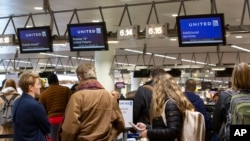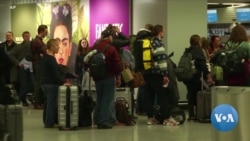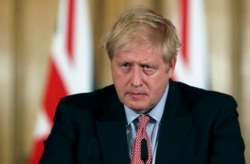The European Union has criticized U.S. President Donald Trump’s decision to ban most European travelers from entering the United States for 30 days. From midnight Friday Washington time, all foreign nationals who have entered the EU’s border-free Schengen zone in the previous 14 days will be barred from U.S. entry, in an effort to stop the spread of the coronavirus.
The move sent panic through financial markets as fears grew over the economic impact of the pandemic, with London’s FTSE 100 index closing down more than 10%.
At airports across Europe, long lines formed at check-in and ticketing desks as travel plans were thrown into chaos.
Like many American tourists in Europe, Joel Hare decided to get the next flight back home after hearing of the travel ban on the news.
“We were not sure if we would be able to get back in if something was canceled, so I spent $3,000 for another flight,” Hare said. U.S. authorities, however, have said the travel ban applies only to foreign nationals, not U.S. citizens or their families.
Many stranded travelers voiced anger at the sudden U.S. decision.
“It is a measure that Trump has taken because he is inept and has not been able to take any action there, so he is somehow blaming the external enemy, in this case Europe,” said Spanish national Miguel Paracuellos, who was trying to return to his home in Miami from Madrid.
In trying to justify the ban, Trump said EU states had not "taken the same precautions" as the U.S.
The European Union strongly rejected that claim.
“The U.S. decision to impose a travel ban was taken unilaterally and without consultation. The European Union is taking strong action to limit the spread of the virus,” European Commission spokesman Eric Mamer told reporters Thursday.
Britain and Ireland are exempt, even though they have hundreds of cases of the virus. Washington’s explanation is that neither country is part of the borderless Schengen travel zone.
Following a meeting of the government’s emergency “COBRA” planning committee Thursday, British Prime Minister Boris Johnson warned the situation would become worse.
“I've got to be clear … this is the worst public health crisis for a generation. Some people compare it to seasonal flu. Alas, that is not right. Owing to the lack of immunity, this disease is more dangerous and it's going to spread further. And I must level with you, level with the British public, many more families are going to lose loved ones before their time,” Johnson said.
The U.S. already has more than 1,300 coronavirus cases. With the World Health Organization declaring a global pandemic, more drastic measures are needed, said virologist Dr. Sterghios Moschos of Britain’s University of Northumbria.
“My personal opinion is that movement restriction is required across the nations that have hundreds of cases, which includes the United States; it includes the United Kingdom, and it includes many European states,” Moschos told VOA.
In Italy, where about 1,000 people have died from the virus, all nonessential shops and services have been ordered to close.
“Hospitals there are overwhelmed,” Moschos said. “They don’t even have enough oxygen anymore to give to people who have dyspnea [shortness of breath]. So if this doesn’t contextualize the severity of the situation ... then I’m not sure what will.”
Many EU countries are reinstating internal border checks. With the latest travel restrictions imposed by the United States, the global economic cost is growing by the day.








